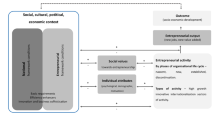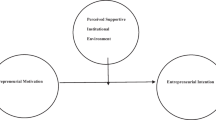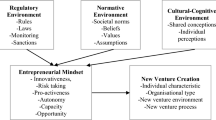Abstract
This research aims to analyze the impact of institutional elements, including students’ exposure to entrepreneurship education, faculty support for students’ development of entrepreneurial skills, and the prevalence of an entrepreneurial mindset, on undergraduate students’ propensity to engage in entrepreneurial behavior. Additionally, the study considers the entrepreneurial mindset as a moderator and institutional backing as a facilitator. The research focused on a selection of private, middle-ranking universities in Lahore, Pakistan. A web-based survey was conducted, and 384 participants were chosen for the partial least squares structural equation modeling (PLS-SEM) analysis. All hypotheses regarding both direct and indirect connections were confirmed by the data. Furthermore, except for one, hypotheses regarding the moderating relationship of institutional support showed significant moderation. This study provides new insights into how universities can enhance entrepreneurial culture through a comprehensive teaching and mentoring program that considers institutional support. It serves as a guide for private, middle-class institutions aiming to cultivate an entrepreneurial spirit among their business students. The researcher’s contribution to the existing literature includes a focus on the entrepreneurial mindset in the context of private higher education institutions in Lahore, Pakistan. The study employs entrepreneurial institutional factors, entrepreneurial attitude as a mediating variable, and institutional support as a moderating variable to foster a growth mindset among students, distinguishing it from previous research.


Similar content being viewed by others
Data Availability
Data is available on request.
References
Akcay, O., Sun, Q., Almerico, G., Lafferty, B., Matulich, E., Liu, M., . . . Shao, B. (2014). Political and economic impacts on Chinese students’ return. Journal of International Business Studies, 33(2), 1–6.
Ali, S., & Talha, N. (2022). During COVID‐19, impact of subjective and objective financial knowledge and economic insecurity on financial management behavior: Mediating role of financial wellbeing. Journal of Public Affairs, 22, e2789.
Amorós, J. E., & Mandakovic, V. (2017). The Chilean entrepreneurial ecosystem: Understanding the gender gap in entrepreneurial activity. In Entrepreneurial Ecosystems and Growth of Women’s Entrepreneurship: Edward Elgar Publishing.
Amorós, J. E., Bosma, N., & Levie, J. (2013a). Ten years of global entrepreneurship monitor: Accomplishments and prospects. International Journal of Entrepreneurial Venturing, 5(2), 120–152.
Amorós, J. E., Felzensztein, C., & Gimmon, E. (2013b). Entrepreneurial opportunities in peripheral versus core regions in Chile. Small Business Economics, 40(1), 119–139.
Anderson, D. L. (2001). Development of an instrument to measure pain in rheumatoid arthritis: Rheumatoid Arthritis Pain Scale (RAPS). Arthritis Care & Research: Official Journal of the American College of Rheumatology, 45(4), 317–323.
Ao, J., & Liu, Z. (2014). What impacts entrepreneurial intention? Cultural, environmental, and educational factors. Journal of Management Analytics, 1(3), 224–239.
Arenius, P., & Minniti, M. (2005). Perceptual variables and nascent entrepreneurship. Small Business Economics, 24, 233–247.
Arkes, H. R., Bar-Hillel, M., Beach, L. R., Brehmer, B., Brett, J. B., Castellan, N. J. Jr., & Edwards, W. (1991). Organizational behavior and human decision processes.
Aziz, N., Nisar, Q. A., Koondhar, M. A., Meo, M. S., & Rong, K. (2020). Analyzing the women’s empowerment and food security nexus in rural areas of Azad Jammu & Kashmir, Pakistan: By considering the sense of land entitlement and infrastructural facilities. Land Use Policy, 94, 104529.
Bolton, B. (2004). Entrepreneurs: Talent, temperament, technique Ed. 2. Taylor & Francis.
Botsaris, C., & Vamvaka, V. (2016a). Attitude toward entrepreneurship: Structure, prediction from behavioral beliefs, and relation to entrepreneurial intention. Journal of the Knowledge Economy, 7, 433–460.
Botsaris, C., & Vamvaka, V. (2016b). Attitude toward entrepreneurship: Structure, prediction from behavioral beliefs, and relation to entrepreneurial intention. Journal of the Knowledge Economy, 7(2), 433–460.
Brown, C. (2019). Challenges and opportunities in developing entrepreneurial minds: A case study of higher education in Pakistan.
Carr, J. C., & Sequeira, J. M. (2007). Prior family business exposure as intergenerational influence and entrepreneurial intent: A theory of planned behavior approach. Journal of Business Research, 60(10), 1090–1098.
Collins, L., Hannon, P. D., & Smith, A. (2004). Enacting entrepreneurial intent: The gaps between student needs and higher education capability. Education+ Training, 46(8/9), 454–463.
Commarmond, I. (2017). In pursuit of a better understanding of and measuring for an entrepreneurial mindset. The Allan Gray Orbis Foundation.
Cui, J., Sun, J., & Bell, R. (2021). The impact of entrepreneurship education on the entrepreneurial mindset of college students in China: The mediating role of inspiration and the role of educational attributes. The International Journal of Management Education, 19(1), 100296.
Davis, M. H., Hall, J. A., & Mayer, P. S. (2016). Developing a new measure of entrepreneurial mindset: Reliability, validity, and implications for practitioners. Consulting Psychology Journal: Practice and Research, 68(1), 21.
De Novellis, M. (2021). 5 ways business students are making a social impact. [AACSB Insights]. Retrieved from https://www.aacsb.edu/insights/articles/2021/02/5-ways-business-students-are-making-a-social-impact
Drucker, P. F. (1985). Entrepreneurial strategies. California Management Review (pre-1986), 27(000002), 9.
Dyer, W. G., Jr. (1995). Toward a theory of entrepreneurial careers. Entrepreneurship Theory and Practice, 19(2), 7–21.
Fairlie, R. W., Morelix, A., Reedy, E. J., & Russell-Fritch, J. (2015). The kauffman index 2015: Startup activity| national trends. Available at SSRN 2613479.
Fayolle, A., Gailly, B., & Lassas‐Clerc, N. (2006). Assessing the impact of entrepreneurship education programmes: A new methodology. Journal of European Industrial Training.
Fellnhofer, K., & Kraus, S. (2015). Examining attitudes towards entrepreneurship education: A comparative analysis among experts. International Journal of Entrepreneurial Venturing, 7(4), 396–411.
Fernández-Pérez, V., Montes-Merino, A., Rodríguez-Ariza, L., & Galicia, P. E. A. (2019). Emotional competencies and cognitive antecedents in shaping student’s entrepreneurial intention: The moderating role of entrepreneurship education. International Entrepreneurship and Management Journal, 15(1), 281–305.
Fiet, J. O. (2001). The theoretical side of teaching entrepreneurship. Journal of Business Venturing, 16(1), 1–24.
Georgia, E. J., & Doss, B. D. (2013). Web-based couple interventions: Do they have a future? Journal of Couple & Relationship Therapy, 12(2), 168–185.
Guerrero, M., Urbano, D., Cunningham, J., & Organ, D. (2014). Entrepreneurial universities in two European regions: A case study comparison. The Journal of Technology Transfer, 39(3), 415–434.
Guo, H., Xu, E., & Jacobs, M. (2014). Managerial political ties and firm performance during institutional transitions: An analysis of mediating mechanisms. Journal of Business Research, 67(2), 116–127.
Hair, J. F. Jr., Sarstedt, M., Matthews, L. M., & Ringle, C. M. (2016). Identifying and treating unobserved heterogeneity with FIMIX-PLS: Part I–method. European Business Review, 28(1), 63–76.
Hair, J. F., Risher, J. J., Sarstedt, M., & Ringle, C. M. (2019). When to use and how to report the results of PLS-SEM. European Business Review, 31(1), 2–24.
Hair, J. F. Jr., Hult, G. T. M., Ringle, C. M., Sarstedt, M., Danks, N. P., & Ray, S. (2021). Partial least squares structural equation modeling (PLS-SEM) using R: A workbook. In: Springer Nature.
Hattab, H. W. (2014). Impact of entrepreneurship education on entrepreneurial intentions of university students in Egypt. The Journal of Entrepreneurship, 23(1), 1–18.
Hidayanto, A. N., Anggorojati, B., Abidin, Z., & Phusavat, K. (2020). Data modeling positive security behavior implementation among smart device users in Indonesia: A partial least squares structural equation modeling approach (PLS-SEM). Data in Brief, 30, 105588.
Hofstede, G. (2001). Culture’s consequences: Comparing values, behaviors, institutions and organizations across nations. Sage publications.
Hussain, A., & Norashidah, D. (2015). Impact of entrepreneurial education on entrepreneurial intentions of Pakistani Students. Journal of Entrepreneurship and Business Innovation, 2(1), 43–53.
Iakovleva, T., Solesvik, M., & Trifilova, A. (2013). Financial availability and government support for women entrepreneurs in transitional economies: Cases of Russia and Ukraine. Journal of Small Business and Enterprise Development.
Jabeen, F., Faisal, M. N., & Katsioloudes, M. I. (2017). Entrepreneurial mindset and the role of universities as strategic drivers of entrepreneurship: Evidence from the United Arab Emirates. Journal of Small Business and Enterprise Development, 24(1), 136–157.
Jena, R. K. (2020). Measuring the impact of business management Student’s attitude towards entrepreneurship education on entrepreneurial intention: A case study. Computers in Human Behavior, 107, 106275.
Johnson, A. (2018). The role of education in fostering entrepreneurial minds.
Kelley, D., Singer, S., & Herrington, M. (2016). Global entrepreneurship monitor. Global Report, Global Entrepreneurship Research Association, London Business School, Regents Park, London NW1 4SA, UK.
Kibler, E. (2013). Formation of entrepreneurial intentions in a regional context. Entrepreneurship & Regional Development, 25(3–4), 293–323.
Kreiser, P. M., Marino, L. D., Dickson, P., & Weaver, K. M. (2010). Cultural influences on entrepreneurial orientation: The impact of national culture on risk-taking and proactiveness in SMEs. Entrepreneurship Theory and Practice, 34(5), 959–984.
Krejcie, R. V., & Morgan, D. W. (1970). Determining sample size for research activities. Educational and Psychological Measurement, 30(3), 607–610.
Kuratko, D. F., Hornsby, J. S., & Covin, J. G. (2014). Diagnosing a firm’s internal environment for corporate entrepreneurship. Business Horizons, 57(1), 37–47.
Li, H., & Atuahene-Gima, K. (2001). Product innovation strategy and the performance of new technology ventures in China. Academy of Management Journal, 44(6), 1123–1134.
Lins, F. A., & Doktor, R. (2014). A theory of entrepreneurial opportunity discovery, knowledge creation, and decision-making. Business and Management Research, 3(1), 18–30.
Liu, X., Lin, C., Zhao, G., & Zhao, D. (2019). Research on the effects of entrepreneurial education and entrepreneurial self-efficacy on college students’ entrepreneurial intention. Frontiers in Psychology, 10, 869.
Lorz, M., Mueller, S., & Volery, T. (2013). Entrepreneurship education: A systematic review of the methods in impact studies. Journal of Enterprising Culture, 21(02), 123–151.
Lukman, S., Bao, P. X., Kweku‐Lugu, B., Arkorful, V. E., Latif, A., Gadabu, A., . . . Sadiq, M. A. (2021). Diasporan students social entrepreneurship intention: The moderating role of institutional support. Journal of Public Affairs, 21(1), e2108.
Lundström, A., & Stevenson, L. (2005). Entrepreneurship policy: Theory and practice (Vol. 9). Springer.
Magdaraog, G. A., Jr. (2015). Setting a global mindset for future entrepreneurs: The share of bulacan state university as an academic institution. Procedia-Social and Behavioral Sciences, 176, 483–488.
Mahendra, A. M., Djatmika, E. T., & Hermawan, A. (2017). The effect of entrepreneurship education on entrepreneurial intention mediated by motivation and attitude among management students, State University of Malang. Indonesia. International Education Studies, 10(9), 61–69.
Miranda, F. J., Chamorro-Mera, A., & Rubio, S. (2017). Academic entrepreneurship in Spanish universities: An analysis of the determinants of entrepreneurial intention. European Research on Management and Business Economics, 23(2), 113–122.
Moberg, K. (2014). Two approaches to entrepreneurship education: The different effects of education for and through entrepreneurship at the lower secondary level. The International Journal of Management Education, 12(3), 512–528.
Moorhead, G., & Griffin, R. (2004). Organizational behavior, managing people and organization, New York, Haughton. In: Mifflin Company.
Moraru, C., & Rusei, A. (2012). Business incubators–Favorable environment for small and medium enterprises development. Theoretical and Applied Economics, 5(5), 169.
Mukhtar, S., Wardana, L. W., Wibowo, A., & Narmaditya, B. S. (2021). Does entrepreneurship education and culture promote students’ entrepreneurial intention? The mediating role of entrepreneurial mindset. Cogent Education, 8(1), 1918849.
Ndou, V., Mele, G., & Del Vecchio, P. (2019). Entrepreneurship education in tourism: An investigation among European Universities. Journal of Hospitality, Leisure, Sport & Tourism Education, 25, 100175.
Nolder, C. J., & Kadous, K. (2018). Grounding the professional skepticism construct in mindset and attitude theory: A way forward. Accounting, Organizations and Society, 67, 1–14.
Noreen, S., Nisar, Q. A., Haider, S., & Yean, T. F. (2021). Role of leaders’ emotional labor toward leader’s job satisfaction and emotional exhaustion: Moderating role of psychological capital. Gadjah Mada International Journal of Business, 23(1), 36–54.
OECD. (2009). Evaluation of programs concerning education for entrepreneurship. Retrieved from OECD, Paris.
Ogunsade, A. I., Obembe, D., Woldesenbet, K., & Kolade, S. (2021). Entrepreneurial attitudes among university students: The role of institutional environments and cultural norms. Entrepreneurship Education, 4, 169–190.
Pihie, Z. A. L., & Bagheri, A. (2010). Entrepreneurial attitude and entrepreneurial efficacy of technical secondary school students. Journal of Vocational Education and Training, 62(3), 351–366.
Pihie, Z. A. L., & Bagheri, A. (2013). Self-efficacy and entrepreneurial intention: The mediation effect of self-regulation. Vocations and Learning, 6, 385–401.
Podsakoff, N. (2003). Common method biases in behavioral research: A critical review of the literature and recommended remedies. Journal of Applied Psychology, 885(879), 10.1037.
Porta, R. L., Lopez-de-Silanes, F., & Shleifer, A. (2008). The economic consequences of legal origins. Journal of Economic Literature, 46(2), 285–332.
Puni, A., Anlesinya, A., & Korsorku, P. D. A. (2018). Entrepreneurial education, self-efficacy and intentions in Sub-Saharan Africa. African Journal of Economic and Management Studies.
Rae, D. (2005). Entrepreneurial learning: A narrative‐based conceptual model. Journal of Small Business and Enterprise Development.
Reyad, S. M. R., Al-Sartawi, A. M., Badawi, S., & Hamdan, A. (2019). Do entrepreneurial skills affect entrepreneurship attitudes in accounting education? Higher Education, Skills and Work-Based Learning.
Reynolds, P., Storey, D. J., & Westhead, P. (2007). Cross-national comparisons of the variation in new firm formation rates. Regional Studies, 41(S1), S123–S136.
Roomi, M. A., & Harrison, P. (2008). Training needs for women‐owned SMEs in England. Education+ Training.
Sajjad, S. I., & Dad, A. M. (2012). Impact of culture on entrepreneur intention. Information Management and Business Review, 4(1), 30–34.
Saulo, E. C., Forsberg, B. C., Premji, Z., Montgomery, S. M., & Björkman, A. (2008). Willingness and ability to pay for artemisinin-based combination therapy in rural Tanzania. Malaria Journal, 7(1), 1–10.
Şeşen, H., & Pruett, M. (2014). The impact of education, economy, and culture on entrepreneurial motives, barriers and intentions: A comparative study of the United States and Turkey. The Journal of Entrepreneurship, 23(2), 231–261.
Shami, P. A. (2005). Education in Pakistan: Policies and policy formulation. National Book Foundation, Ministry of Education.
Shane, S., & Venkataraman, S. (2021). Entrepreneurship as a field of research: A review of 21st-century research in entrepreneurship. Journal of Business Venturing, 36(6), 105925.
Sihotang, J., Puspokusumo, R., Sun, Y., & Munandar, D. (2020). Core competencies of women entrepreneur in building superior online business performance in Indonesia. Management Science Letters, 10(7), 1607–1612.
Smith, J. (2020). Entrepreneurship education in higher education: A review of current trends. Journal of Business Education, 15(2), 123–145. https://doi.org/10.1234/jbe.2020.6789
Tian, Z., Hafsi, T., & Wu, W. (2009). Institutional determinism and political strategies: An empirical investigation. Business & Society, 48(3), 284–325.
Taormina R. J. (2007). Measuring chinese entrepreneurial motivation. International Journal of Entrepreneurial Behaviour & Research, 13(4), 200–221.
Tucker, M. L., & McCarthy, A. M. (2001). Presentation self-efficacy: Increasing communication skills through service-learning. Journal of Managerial Issues, 227–244.
Vargas-Hernández, J. G., Noruzi, M. R., & Sariolghalam, N. (2010). An exploration of the effects of Islamic culture on entrepreneurial behaviors in Muslim countries. Asian Social Science, 6(5), 120.
Vega-Gómez, F. I., Miranda González, F. J., Chamorro Mera, A., & Pérez-Mayo, J. (2020). Antecedents of entrepreneurial skills and their influence on the entrepreneurial intention of academics. SAGE Open, 10(2), 2158244020927411.
Wach, K., & Wojciechowski, L. (2016). Entrepreneurial intentions of students in Poland in the view of Ajzen’s theory of planned behavior. Entrepreneurial Business and Economics Review, 4(1), 83.
Wardana, L. W., Narmaditya, B. S., Wibowo, A., Mahendra, A. M., Wibowo, N. A., Harwida, G., & Rohman, A. N. (2020). The impact of entrepreneurship education and students' entrepreneurial mindset: The mediating role of attitude and self-efficacy. Heliyon, 6(9).
Wardana, L. W., Narmaditya, B. S., Wibowo, A., Saraswati, T. T., & Indriani, R. (2021). Drivers of entrepreneurial intention among economics students in Indonesia. Entrepreneurial Business and Economics Review, 9(1), 61–74.
World Bank Group. (2018). World development report 2019. World Bank Publications.
Xin, K. K., & Pearce, J. L. (1996). Guanxi: Connections as substitutes for formal institutional support. Academy of Management Journal, 39(6), 1641–1658.
Author information
Authors and Affiliations
Contributions
Ahmad Bilal: conceptualization, data curation, methodology, and writing original draft. Shahzad Ali: concept, data collection, data handling, methodology, and analysis. Muhammad Haseeb Shakil: corresponding author, refining the concept, data handling, and data analysis. Muhammad Mukarram: writing, reviewing, and editing the final draft. Sayyed Zaman Haider: revision, review, and editing of the final draft.
Corresponding author
Ethics declarations
Ethical Approval and Consent to Participate
This research does not involve any human or animal testing.
Consent for Publication
Not applicable.
Competing Interests
The authors declare no competing interests.
Additional information
Publisher's Note
Springer Nature remains neutral with regard to jurisdictional claims in published maps and institutional affiliations.
Rights and permissions
Springer Nature or its licensor (e.g. a society or other partner) holds exclusive rights to this article under a publishing agreement with the author(s) or other rightsholder(s); author self-archiving of the accepted manuscript version of this article is solely governed by the terms of such publishing agreement and applicable law.
About this article
Cite this article
Bilal, A., Ali, S., Shakil, M.H. et al. Cultivating Entrepreneurial Minds: Unleashing Potential in Pakistan’s Emerging Entrepreneurs Using Structural Equational Modeling. J Knowl Econ (2024). https://doi.org/10.1007/s13132-024-01898-w
Received:
Accepted:
Published:
DOI: https://doi.org/10.1007/s13132-024-01898-w




